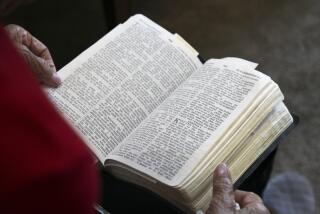Scholar Poses a New View of Early Christians : Books: Professor’s interpretation of the Dead Sea Scrolls sees a more militant origin of Western religion.
- Share via
FOUNTAIN VALLEY — Robert Eisenman’s five-bedroom home is at the vortex of an intellectual whirlwind of Biblical proportions.
The floors are piled high with boxes of yellowed documents. Books abound, with pages open to obscure passages. And everywhere an atmosphere of creative disorder prevails, a sort of rumbling of the mind and spirit borne of a feverish true belief.
“I work at home,” explains Eisenman, chairman of the department of religious studies at Cal State Long Beach. “I find this very exciting.”
The source of his excitement was the publication of Eisenman’s new book, “The Dead Sea Scrolls Uncovered,” the first complete translation of 50 key scroll fragments never seen by the public. Eisenman, 54, believes that the book, published this week, could blow the lid off traditional views of early Judeo-Christian beliefs, changing forever the way the origins of Western religion are seen.
“The question on the lips of the public has been, ‘What is in those scrolls?’ ” the professor said, repeating a query that has been inspiring headlines for years. “Well, here it is and it (provides) a tremendous insight into life in the 1st Century BC.”
A key element of that life, according to Eisenman, who co-authored the book with University of Chicago professor Michael Wise, is that the early Christians were more tied to Judaism, more aggressive, more nationalistic, more messianic and far more militant than Biblical scholars have traditionally believed.
It is a controversial view--Eisenman has numerous critics in the world of religious scholarship--and not one that he arrived at quickly.
The son of a chemist from South Orange, N.J., he made his first trip to Israel after graduating from Cornell University in 1958 with a bachelor’s degree in philosophy. After spending some time on a kibbutz there writing poetry and teaching math and English, he returned to the United States and earned a doctorate in Mideast studies, eventually specializing in Middle Eastern religions, including early Christianity in Palestine.
Eisenman first became interested in the Dead Sea Scrolls as a graduate student in 1965. In the course of his studies, however, he kept running up against the inaccessibility of the many Dead Sea documents that had yet to be published.
Held by Israel’s Department of Antiquities, the documents had been tightly controlled since their discovery in 1947 by an international committee of scholars based at Harvard University, a group Eisenman has described as a “strange cartel” bent on denying access to anyone who did not share its views.
In 1986, Eisenman began spearheading a drive for access to the closely guarded scrolls. Eventually, his efforts were instrumental in persuading the Israeli government to agree to their release, a move that made international headlines.
Now the Orange County scholar has come out with the first English translation of the new materials, which he believes could radically alter public perceptions.
“These were not people who loved their enemies,” he said of the long-ago writers of the scrolls. “They were a militant, violent, aggressive . . . group preparing for the last apocalyptic war against all evil.”
A collection of 2,000-year-old Palestinian documents that chronicle much of the background of Judaism and Christianity, the Dead Sea Scrolls have traditionally been viewed by most scholars as products of Jewish scribes with little connection to the early Christian church. Eisenman, however, contends that the religious zealots who wrote them--members of a sect called the Essenes, who lived at Qumran overlooking the Dead Sea--not only adhered closely to Jewish law, but can be linked directly to early Christianity.
As evidence, he cites scroll fragments containing language strikingly similar to that which later appeared in the New Testament. He also cites descriptions of a sect leader known as the Teacher of Righteousness, whom he believes may actually have been James, an apostle of Jesus.
Other interesting scroll fragments, Eisenman says, include:
* A revision of the Noah flood story that changes the chronology of events as reported in the Bible;
* Mystical material similar to that contained in the cabala--an early philosophy of Jewish mysticism--which attests to the rapturous excitement of these early religionists.
* Zodiacal references showing the Essenes’s interest in astrology;
* And a disciplinary text in which a Qumran leader orders the punishment of a man found guilty of masturbating.
Taken as a whole, Eisenman’s scroll interpretations paint the picture of an early Christian movement that, during Jesus’ lifetime, was much different than the otherworldly, cosmopolitan and forgiving church created by the apostle Paul and his followers during succeeding generations.
“It gives a lot of ammunition to people into the ‘liberation theology’ of Latin America,” Eisenman said, referring to Christians who advocate religious-based social activism.
Not everyone shares Eisenman’s interpretations of the scrolls.
Stephen A. Reed, a Biblical scholar now teaching at African University in Zimbabwe, has described the Orange County professor as a maverick whose views are fairly isolated. “He’s not really mainstream,” Reed said in an interview earlier this year. “I don’t know that he has a lot of followers.”
William Yarchin, associate director of the Ancient Biblical Manuscript Center in Claremont, agrees, describing Eisenman’s views as “a departure from the consensus of the past several generations regarding the early Christian community.”
And Benjamin Hubbard, a professor of religious studies at Cal State Fullerton, says he is not yet convinced that the early Christians were as aggressive as Eisenman contends.
Yet even his critics give Eisenman major credit for opening up the discussion on such matters.
More to Read
Sign up for our Book Club newsletter
Get the latest news, events and more from the Los Angeles Times Book Club, and help us get L.A. reading and talking.
You may occasionally receive promotional content from the Los Angeles Times.










